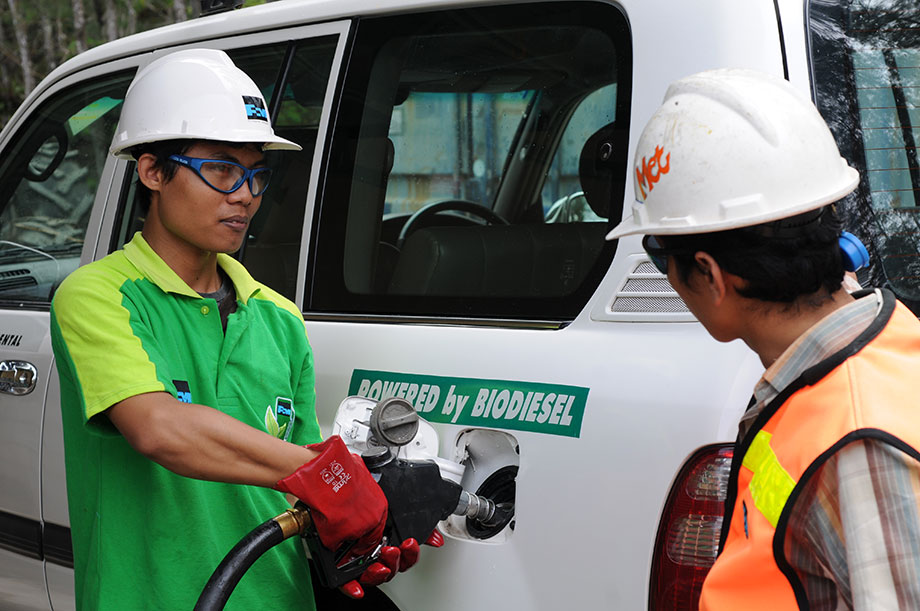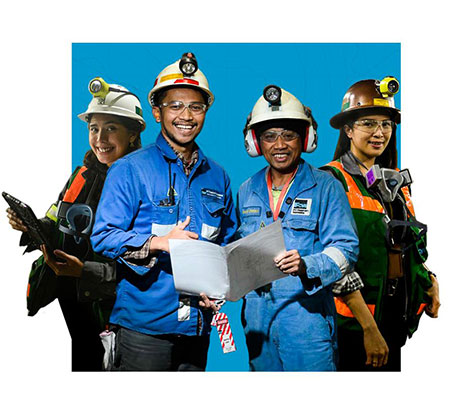PT Freeport Indonesia’s environmental management program covers all aspects of its operation, not just those related to mining. We have a comprehensive waste management system that applies the 3Rs – reuse, recycle, reduce. Our waste minimizing programs involve waste reduction and eco-friendly substitute products.
Recycled or reused items include used lubricating oil collected from workshops across the PTFI operating area and reused as a fuel additive in the Mahaka Lime Plant and Concentrate Dewatering Plant at Portsite; and used batteries from light and heavy vehicles that are shipped to a third party outside the PTFI operating area for recycling and reuse. Other items such as used tires and scrap metal are used to stabilize slopes in several places in Grasberg and the highlands. Discarded containers are reused by PTFI to hold hazardous wastes for shipping to a third party for their management.

Various hazardous wastes are sorted at their point of origin and placed in special containers for hazardous waste. All collection, packaging and storage of hazardous waste generated during operational and supporting facility activity in the PTFI operating area such as assaying of ore samples, biolaboratories, medical facilities, and other processes are managed in Government of Indonesia regulation. The hazardous wastes are transported to licensed local processing industries and do not cross international borders. In 2018, PT Freeport Indonesia in conjunction with third parties managed 3,312 tons of hazardous waste.
PTFI’s management of non-hazardous wastes is carried out in three designated landfill (TPA) locations, namely TPA Koteka, TPA MP74 in the highlands, and TPA MP38 in the lowlands, that are equipped with a collection and treatment system. PTFI has eight sewage treatment plants (IPAL) that are managed in conformance to Government of Indonesia regulation.
Waste water quality in all the plants are monitored regularly, among others for the parameters pH, BOD, TSS, and oil and grease, according to their respective quality standard.
We developed a plan and obtained approval from the Environment Ministry to use ash from boilers in our coal-fired power plants mixed with 5% to 10% cement, for our infill project in our operating area, thereby utilizing our ash stockpiles for productive purposes.
As part of its commitment to sustainable development, PTFI’s environmental management program also carries out an energy management program. PTFI responsibly performs energy management not just to benefit economically, but also towards striving to afford coming generations the same access to energy and to contribute towards maintaining global climate.
In appreciation of this endeavor, PTFI was accorded an Energi Pratama award from the Energy and Mineral Resources (ESDM) Ministry that is bestowed to companies with a high commitment to proactive participation as a corporation making real contributions to development of new technologies, innovations, and the supply and use of energy based on conservation and/or diversification.
Kami menghimbau para pencari kerja untuk berhati-hati dan mewaspadai beragam modus penipuan perekrutan yang mengatasnamakan PT Freeport Indonesia. Dalam setiap proses rekrutmen dan penerimaan karyawan, PT Freeport Indonesia maupun konsultan rekruitmennya tidak memungut biaya apapun.
Untuk melihat lowongan, silakan akses melalui link berikut: ptfi e-recruitment
Untuk melihat informasi magang, silakan akses melalui link berikut: Internship Program
